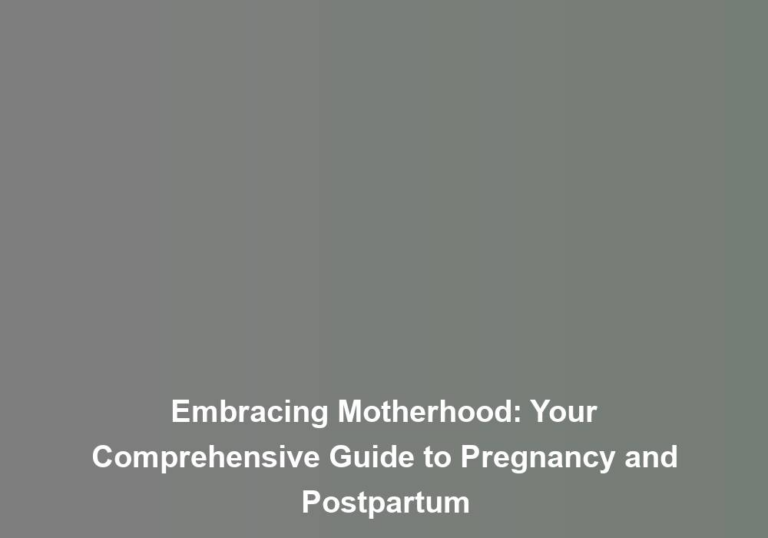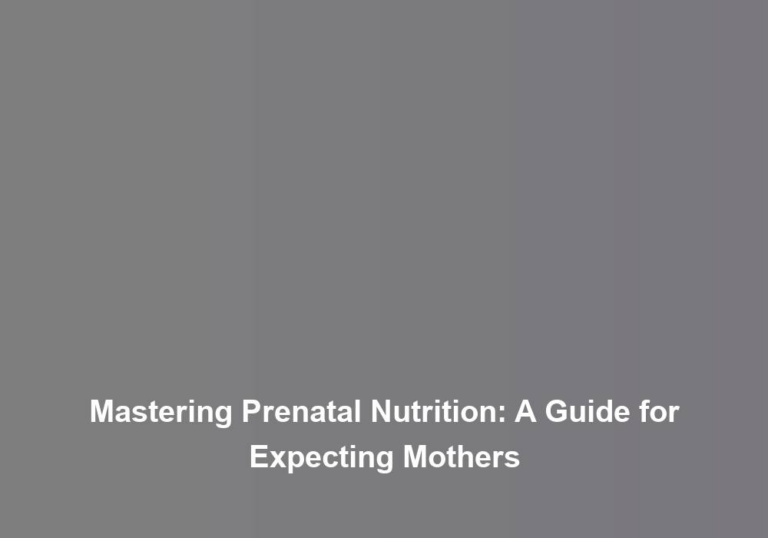Empowering Women: Your Complete Guide to Reproductive Health
YouG??re standing at a fork in the road, trying to decide which path will lead to a future where youG??re in control of your own well-being. Navigating the landscape of reproductive health can often feel like embarking on an unfamiliar journey, but it doesnG??t have to be that way. As you ponder the myriad choices and decisions ahead, wouldnG??t it be comforting to have a comprehensive guide at your fingertips, offering insights and knowledge to empower you on this important aspect of your life? You may just find that this guide could be the compass youG??ve been searching for.
Menstrual Health
Taking care of your menstrual health is an essential aspect of maintaining overall well-being and reproductive health. Understanding and managing your menstrual cycle is crucial for your reproductive health. The menstrual cycle is the regular natural change that occurs in the female reproductive system, preparing the body for pregnancy each month. It involves a delicate interplay of hormones, and any imbalance can affect your overall health. Menstrual hygiene is vital during this time to prevent infections and maintain comfort.
ItG??s important to track your menstrual cycle, as irregularities can signal underlying health issues. Keeping a record of your cycle can help identify patterns and potential problems, enabling you to seek timely medical advice if necessary. Menstrual hygiene products, such as sanitary pads, tampons, or menstrual cups, should be chosen based on your comfort and convenience. Changing these products regularly is essential to prevent infections and discomfort.
Maintaining good menstrual hygiene also involves proper disposal of used sanitary products and maintaining cleanliness during your period. ItG??s crucial to wash your genital area regularly and change your sanitary products every 4-6 hours. Additionally, staying hydrated and eating a balanced diet can help alleviate menstrual symptoms and support overall reproductive health.
Understanding and managing your menstrual health not only contributes to your physical well-being but also empowers you to take charge of your reproductive health. By prioritizing menstrual hygiene and understanding your menstrual cycle, you are actively investing in your overall health and well-being.
Contraception Options
Managing your reproductive health involves not only understanding and caring for your menstrual cycle but also exploring the various contraception options available to you. When it comes to contraception, there are a variety of methods to consider, each with its own benefits and considerations.
-
Hormonal Methods: These methods, such as birth control pills, patches, and hormonal IUDs, work by altering hormone levels to prevent ovulation and thicken cervical mucus, making it difficult for sperm to reach the egg.
-
Non-Hormonal Methods: If you prefer to avoid hormonal contraception, non-hormonal options like copper IUDs, barrier methods (such as condoms and diaphragms), and fertility awareness methods can be effective in preventing pregnancy without affecting your hormone levels.
-
Long-Acting Methods: Long-acting contraceptives, including hormonal and non-hormonal IUDs, implants, and injections, provide protection for an extended period, ranging from several months to several years, offering convenience and effectiveness without daily maintenance.
-
Short-Acting Methods: Short-acting contraceptives, such as birth control pills, patches, and condoms, require more frequent use and adherence to specific guidelines for effectiveness but offer flexibility for those who may want to conceive in the near future.
Understanding the different contraception options available, including hormonal and non-hormonal methods, as well as long-acting and short-acting options, will empower you to make informed decisions about your reproductive health and choose the method that best fits your needs and lifestyle.
Fertility Awareness
Exploring fertility awareness can empower you to understand and track your menstrual cycle, helping you identify your most fertile days and plan or prevent pregnancy accordingly. Fertility tracking involves monitoring biological signs such as basal body temperature, cervical mucus, and menstrual cycle length to predict ovulation. By recognizing the signs of impending ovulation, you can pinpoint your most fertile window and make informed decisions about conception or contraception.
Understanding your menstrual cycle and ovulation pattern is essential for fertility awareness. Ovulation prediction kits are available to help you detect the surge in luteinizing hormone that precedes ovulation. These kits can be a valuable tool in combination with other fertility tracking methods, providing a clearer picture of your fertile days.
Fertility awareness is not only useful for those trying to conceive, but also for those wanting to prevent pregnancy without hormonal contraception. By identifying the fertile window, you can either abstain from intercourse or use barrier methods during this time to avoid pregnancy naturally.
Empowering yourself with knowledge about your fertility can lead to a deeper understanding of your body and reproductive health. By embracing fertility awareness, you can take control of your reproductive choices and make informed decisions about family planning. Whether you are trying to conceive or prevent pregnancy, fertility tracking can provide valuable insight into your unique menstrual cycle and ovulation patterns.
Sexual Health
Understanding and prioritizing sexual health is essential for maintaining overall well-being and promoting healthy relationships. When it comes to sexual health, itG??s important to stay informed and take proactive steps to protect yourself. Here are some key points to consider:
-
Comprehensive Sex Education: Access to comprehensive sex education is vital for understanding oneG??s body, reproductive health, and making informed choices. It provides essential information about contraception, consent, and healthy relationships, empowering individuals to make responsible decisions.
-
STI Prevention: Practicing safe sex is crucial for preventing sexually transmitted infections (STIs). This includes proper and consistent use of barrier methods such as condoms, regular STI testing, and open communication with sexual partners about sexual health.
-
Regular Health Check-Ups: Regular visits to a healthcare provider for sexual health screenings and check-ups are important for early detection and prevention of any potential issues. ItG??s an opportunity to discuss any concerns, receive guidance, and stay proactive about your sexual health.
-
Open Communication: Healthy relationships thrive on open and honest communication, including discussions about sexual health. Being able to talk openly with your partner about sexual history, boundaries, and any concerns fosters a supportive and respectful environment.
Prioritizing sexual health through education, prevention, and open communication contributes to overall well-being and helps foster healthy, fulfilling relationships. By taking proactive steps to care for your sexual health, you are empowering yourself and promoting a positive and respectful approach to intimacy.
Reproductive Disorders
Reproductive disorders can impact various aspects of your reproductive health, potentially affecting fertility and overall well-being. Conditions such as endometriosis and polycystic ovary syndrome (PCOS) can pose significant challenges. Endometriosis management often involves a combination of medication and surgical options to alleviate symptoms and improve fertility. PCOS treatment focuses on managing symptoms, regulating menstrual cycles, and addressing fertility concerns.
Infertility causes can be multifaceted, including factors like ovulation disorders, uterine or cervical abnormalities, and hormonal imbalances. Hormonal imbalance effects can impact your menstrual cycle, ovulation, and overall reproductive health. ItG??s essential to seek guidance from healthcare professionals who can provide personalized treatment plans to address these issues effectively.
Reproductive disorders can be emotionally taxing and may impact your mental and emotional well-being. ItG??s crucial to seek support from healthcare providers, support groups, or mental health professionals to navigate the challenges that may arise. Remember, you are not alone, and seeking help is a sign of strength.
If you are experiencing symptoms or have concerns about reproductive disorders, itG??s important to schedule an appointment with a healthcare provider. Being proactive about your reproductive health can lead to early detection and effective management of these conditions. Remember, your well-being matters, and you deserve comprehensive support and care.
Wellness and Self-Care
Taking care of your well-being is crucial for maintaining good reproductive health. Self-care practices such as regular exercise, healthy eating, and stress management can positively impact your overall well-being. Additionally, seeking mental health support when needed is an important part of maintaining a healthy reproductive system.
Self-Care Practices
Prioritize your overall wellness by incorporating self-care practices into your daily routine, promoting a healthy and balanced reproductive health. Here are some simple self-care practices that can make a big difference in your overall well-being:
- Mindfulness Meditation: Take a few minutes each day to practice mindfulness meditation, which can help manage stress and promote mental clarity.
- Regular Exercise: Engage in regular physical activity to improve your holistic wellness. Exercise releases endorphins, reduces stress, and boosts overall mood.
- Healthy Eating: Nourish your body with a balanced diet rich in fruits, vegetables, lean proteins, and whole grains. Eating well can support reproductive health and overall well-being.
- Quality Sleep: Prioritize a good nightG??s sleep. Quality sleep is essential for stress management and maintaining hormonal balance.
Incorporating these self-care practices can significantly impact your reproductive health and overall wellness.
Mental Health Support
Supporting your mental health through wellness and self-care practices is essential for maintaining a balanced and healthy reproductive system. If youG??re struggling with mental health issues, seeking support through therapy options or joining support groups can be incredibly beneficial. Therapy options such as cognitive-behavioral therapy (CBT) or dialectical behavior therapy (DBT) can help you develop coping strategies and improve your overall well-being. Additionally, support groups provide a sense of community and understanding, allowing you to share experiences and learn from others facing similar challenges. ItG??s important to remember that seeking help is a sign of strength, and you deserve to prioritize your mental health. By incorporating mental health support into your overall wellness routine, you can positively impact your reproductive health and overall quality of life.
Conclusion
Take charge of your reproductive health with these empowering tips. From menstrual health to contraception options, fertility awareness to sexual health, and wellness and self-care, you have the power to prioritize your well-being. Stay informed, stay empowered, and remember to practice self-love and self-care. Your reproductive health is a vital part of your overall wellness, and you deserve to feel empowered and supported in every aspect of your journey.







